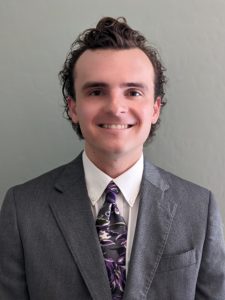
To highlight some of Project Cities star students and faculty, PC staff sat down to interview Hunter Hedelius, an undergraduate student in the School of Social Transformation. During the spring 2022 semester, Hunter worked on a project with City of Peoria as part of Greg Broberg’s JUS 301 Research Methods course. As a culmination of student projects in the last three years, students in Greg’s class set out to understand how Peoria residents get information from the City about events and community services. From this, students conducted a survey of Peoria residents to understand what information is being left out of communities in order to inform recommendations for Peoria to engage its residents. Hunter analyzed the survey data and synthesized the findings for the showcase presentation.
Check out the project final summary report | Community Engagement Strategies
The following dialogue and summary come from an interview with Hunter about his experience in the Project Cities program.
Question : What does sustainability mean to you?
Answer : Sustainability can be challenging to define, but Hunter considers sustainability to be about building communities that support each other, “In terms of contemporary efforts to pursue sustainability, I think we're really seeking to develop strong communities throughout the world, who have access to human rights to resources and the abilities to grow and to develop. So, sustainability means upwards progress for everybody.”
Question : What are you passionate about? What motivates you to study and work for your interests?
Answer : After spending a brief period living in Bolivia as a missionary, Hunter realized his passion for loving people and focusing on the community and what they really want. Based on his experiences, Hunter became interested in global and justice studies, and now wants to work for the United States State Department to work on developing policies for South American countries to help achieve the Sustainable Development Goals.
Question : Do you have any parting advice for students that are coming into the Project Cities program or ASU students in general?
Answer : Hunter reflected that “the university is truly what you make of it…it’s more than just looking to get a piece of paper…but developing skills and being involved in practical experiences,” such as Project Cities. He emphasized that when students are able to take advantage of all the resources the university offers, “that’s how you grow and develop the skills you need to be successful in life.”
Project Cities is a member of the Educational Partnerships for Innovation in Communities Network (EPIC-N) and is administered by ASU’s Julie Ann Wrigley Global Futures Laboratory and the Sustainable Cities Network. Stay up to date with Project Cities and the Sustainable Cities Network by following us on social media or subscribing to our newsletter.